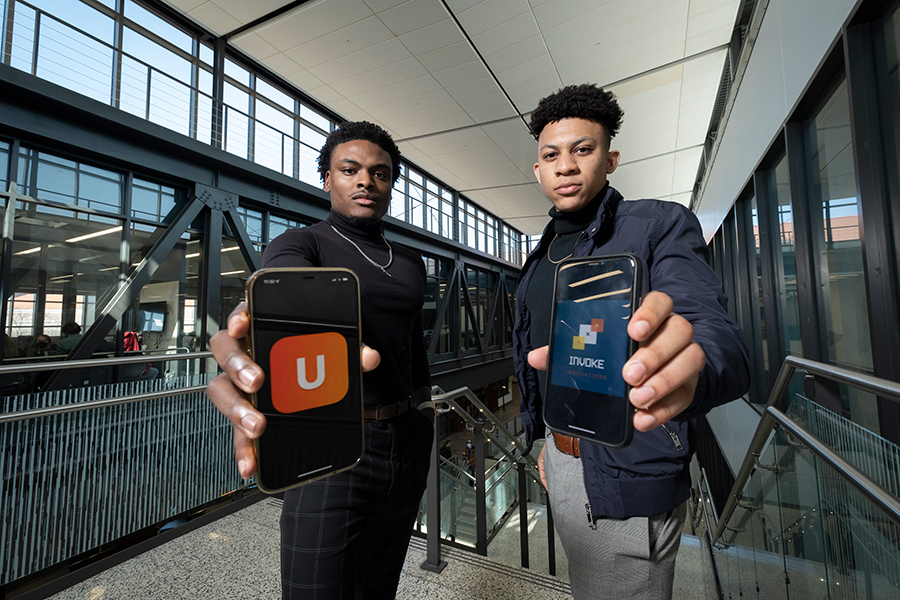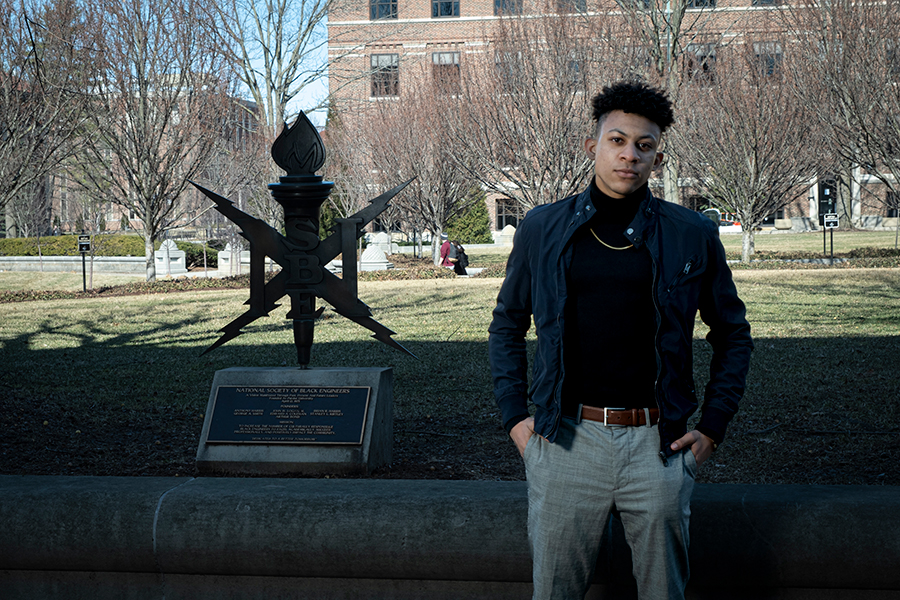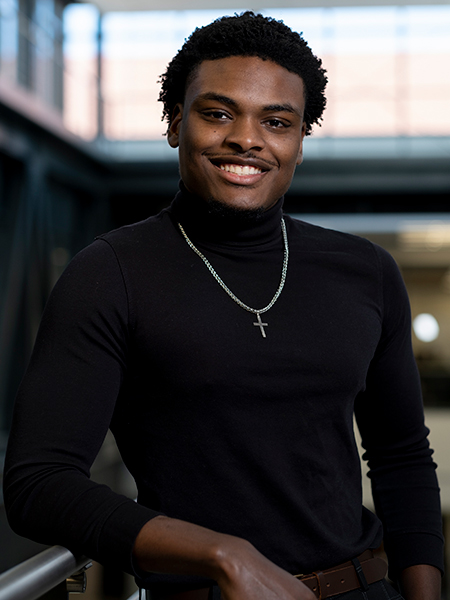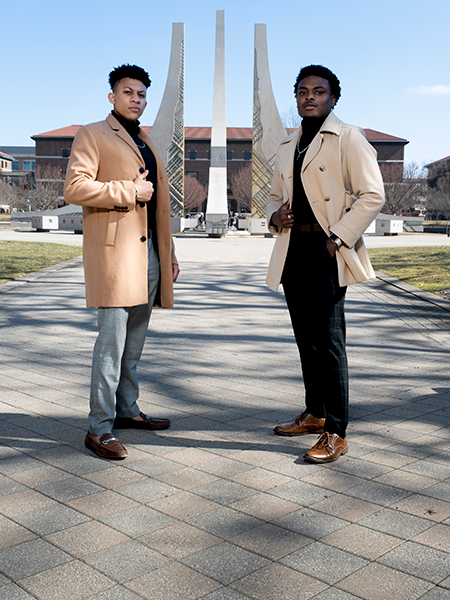Pitching the future of tech: Mechanical Engineering seniors compete in Opportunity Hub entrepreneurial event

Two seniors in Purdue University's School of Mechanical Engineering took the national stage to tour their startups during Opportunity Hub (OHUB)'s HBCU@SXSW pitch competition on March 11 at Huston-Tillotson University in Austin, Texas.
Morgan Fuller and Isaiah Baptiste were competitively selected to join OHUB’s High-Growth Company Building HBCU@SXSW cohort and deliver their presentations during Demo Day in front of a panel of venture capitalist judges. OHUB bills itself as the leading and largest diversity, equity and inclusion initiative of the SXSW Festival and takes place during the interactive and film days of the event. SXSW draws more than 500,000 attendees annually.
Fuller created Invoke, a tool to reduce workplace injuries, with his partner, Tyler Lamar, a Purdue Industrial Engineering graduate. The pair developed the company through the Burton D. Morgan Business Model Competition.
Baptiste's startup, Umerge, is an application that leverages machine learning to enhance the university experience and assist students in developing their interests.
Invoke platform could ‘totally transform’ decision-making
Invoke
Co-founders: Morgan Fuller and Tyler Lamar
Team members:
- Omozafe Udegbe, Principal Biomedical Engineer
- Owusu Bonsu, Head of Software
- Kanika Rao, User Experience Consultant
Purdue organizations represented at SXSW Pitch:
- College of Engineering
- National Society of Black Engineers
- Minority Engineering Program
- Honors College
- Certificate in Entrepreneurship Program
Umerge
Founder: Isaiah Baptiste
Purdue organizations represented at SXSW Pitch:
- School of Mechanical Engineering
- John Martinson Entrepreneurial Center
- Purdue THINK
- National Society of Black Engineers
Fuller comes from a family of healthcare workers and says he has a passion for creating technology that makes human life more dynamic. His research found that 3.7 million workers are injured on the job every year. In 2019, the most frequently reported injuries were caused by slips, trips, falls, strains/overexertions, and micro-injuries stemming from repeated overuse of muscles, tendons, ligaments, joints and/or bones. These problems prompted Invoke to find a preventative solution.
“Our first product, ErGo, is a software platform that is designed to offset the cost of workplace injuries. We aim to provide haptic feedback to alert workers when they are at risk of injury. We also plan to provide investigative tools for businesses and floor workers to understand how injuries are taking place. These tools will provide cost, risk and injury forecasting of various manufacturing climates.”
Throughout the Burton Morgan competition, Invoke team members conducted extensive interviews with company executives from Eaton Corporation, Conagra, Kimberly Clark, and Northwestern Mutual to validate ErGo.
He hopes his company’s attendance at OHUB provided necessary visibility to secure additional resources and assistance for further development of the product and customer base, adding that Invoke also is looking for industry partners to perform testing and case studies to refine its tool.
Fuller currently is working to refine his team’s Minimal Viable Product and to provide safety and risk scoring based on users’ physical activity.
“This will allow businesses to assess the ergonomic climate of the workplace at any time from anywhere around the world. Invoke is diving deep into user experience/user interface (UI/UX) research to explore a compelling app design that will provide the necessary insights and feedback to ensure worker safety,” he said. “This platform has a way to totally transform our decision-making process for safety and cost savings when performing a physical activity.”

Right now, Invoke’s target customers are manufacturing businesses and package logistics companies.
“Invoke has large plans when it comes to reducing the immense cost of workplace injuries. We have the potential to predict the cost and risk of injuries of a manufacturing plant layout before the manufacturing equipment is even purchased through its AI algorithms.”
Looking ahead, Invoke’s capabilities can be useful to a wide variety of industries — even sport teams, Fuller said.
“We have the potential to provide professional sports teams with safety insights regarding specific movements in sports plays. These insights would allow teams to improve training, predict the risk and cost of injuries, and forecast this data over time,” Fuller said. “This would add another layer of expertise to ensure star players are able to shine when they are needed most, rather than sitting on the sidelines due to an injury.”
Umerge metric could become ‘as powerful as a student’s GPA’
Baptiste, who will graduate with a minor in business management, said he always has been devoted to helping others discover opportunities. Growing up in Trinidad and Tobago, he collaborated with globally recognized STEM professionals and introduced them to more than 300 Caribbean students.

“My admission to Purdue only fueled this passion,” Baptiste said. “Throughout my academic journey, I’ve always had a passion for problem-solving with innovative and practical solutions.”
He was a sophomore at Purdue at the advent of the pandemic and worked on an autonomous COVID-19 disinfecting robot as part of Purdue’s Vertically Integrated Projects (VIP) program. “This was my first exposure to the resources that Purdue had in innovation and entrepreneurship,” he said. “As operations moved online, I experienced a boost in the volume of emails promoting clubs, activities, events and activities.”
Baptiste said he and his classmates found the abundance of emails cumbersome, and it was daunting to sort out the ones with relevance to their interests. “This difficulty is where the idea of Umerge was born.”
At first, the concept was simple, he said. He localized traffic from extra-curricular activities into an app that contained a library similar to Boilerlink, the university’s organization and events management system.
“The first pivot occurred when students told me they would use the app initially to discover clubs, but once they found their niche, they would uninstall the app.”
During his involvement with the consulting club Purdue THINK, he uncovered another obstacle — students’ lack of engagement with school resources, adding that many projects and events happen “without any way to discover them beyond word of mouth and knowing the right people.”

This realization gave him the angle he was missing to take Umerge to the next level — developing the app to allow students to discover opportunities as well as fostering learning and development though these activities.
Baptiste currently is working with the lead developer of Boilerlink to complete the UI/UX phase of the app’s development. He also is learning the Categorical Target Variable Reinforcement Model to later design the algorithm for optimized marketing.
“Next up for Umerge is researching school engagement data and determining a correlation between this, academic performance, dropout rates, and academic completion period,” explained Baptiste. From there, the team will build Umerge’s interest index and test it over time to see if an effective outcome is acquired, proving the weight of the platform.
“The future of Umerge is limitless. With years of performance data acquired, Umerge may be able to create a metric for interest, verified with psychological research and statistical significance, that can be as powerful as a student’s GPA,” Baptiste said, adding that this metric could be used to give schools a competitive advantage for prospective students and companies that hire out of Umerge-affiliated schools.
“This has the potential to improve the quality of workers nationwide.”
To make the OHUB trip possible, Fuller and Baptiste received financial support from the John Martinson Entrepreneurial Center, School of Mechanical Engineering, and the College of Engineering Office of Undergraduate Education.
